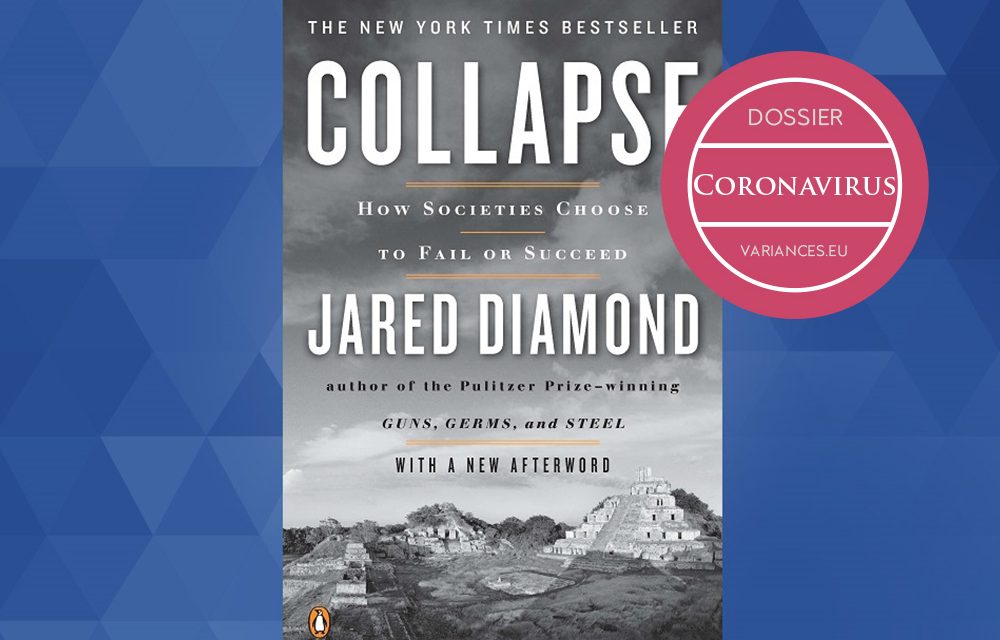Jared Diamond, in his 2005 book entitled Collapse: How Societies Choose to Fail or Succeed, analyses why certain societies have failed to adapt to their environment and collapsed, while others have thrived. From the mysterious Easter Island to the mythical Greenland Norse, Diamond extracts useful insights that help us to better understand the world in which we live: a complex and chaotic one without a doubt, but where, with enough historical hindsight, we can sometimes rise above the noise to detect long-term patterns and draw lessons that illuminate our current predicaments.
All of the problems these societies failed to address were environmental: deforestation, soil erosion, failure to adapt to a changing climate over centuries. For a vast majority, it was human error and not the environment per se that led to collapse. Most of these societies descended into chaos only a few decades after having reached their peak in terms of wealth and prestige. Often, resource stress combined with other factors (including the inability to adapt for cultural reasons) led to conflicts, starvation, emigration and for some, mass extinction. One modern example: the tragic Rwandan genocide. Diamond argues that conflict on the most precious resource, agricultural land, led to rising tensions between ethnic groups, within these groups, and even among families (imagine the problems of having to distribute a small parcel that can barely sustain itself among different children…). For sure, lack of productive land was not the only factor, but it did contribute in a decisive way. When the dust settles, will we say the same thing about the civil war in Syria, which started at a time of rapidly increasing urbanization following a severe drought?
Collapse says something frightening about the world in which we live. Seeing the streets of our bustling cities emptied out, our borders closed, once friendly neighbors now fighting for precious resources (both at the local grocery store and on international markets) has been a humbling experience. Or at least, it should be.
So what can Jared Diamond teach us about the current crisis? Some good news, and some bad news as well. In the face of a life-or-death struggle, societies have failed because of four non-exclusive reasons:
- Anticipation – They failed to anticipate the problem before it arrived
- Perception – They failed to perceive the problem once it is was there
- Willingness – If they did perceive the problem, they failed to try to solve the problem
- Efficiency – If they did try, they failed in their attempt
This framework is an insightful one for the daunting problems that the coronavirus raises.
First, anticipation. An example of this in Diamond’s book is the introduction of rabbits and foxes by British colonists in 19th century Australia: they clearly did not foresee the damages of introducing these species on the fauna and flora. Rabbits rapidly consumed much of the vegetation intended for sheep or cattle, and foxes exterminated numerous native species that had not evolved to survive such predators. Likewise, the Mayans did not anticipate that deforestation in the hills would lead to soil erosion into the valleys.
What about the coronavirus? We have clearly not anticipated such a pandemic, despite the alarming calls of doctors and scientists over the past decades. We have not anticipated it in the long run, notably by not setting up the right institutional frameworks (whether they be national in appropriately funding our health systems, or international with the WHO, the UN or any other body incapable of coordinating responses). Tragically, some leaders have failed to anticipate it in the very short-run as well. Of course, some proved more prepared than others, including South Korea, Germany or Taiwan, to name a few.
Second, perception. At first glance, we can feel satisfied that we have come to terms with the pandemic, taking on bold moves to restrict movement, putting science and technology to use to slow the virus and find a cure. The immediate problem, so to speak, has been identified and isolated. This is good news. Diamond gives numerous examples of peoples who failed to perceive a problem, because they lacked the scientific knowledge. The “why” behind the coronavirus pandemic will surely be debated extensively in the years to come, but part of the answers will undoubtedly involve free movements in goods and people, lack of global coordination, and perhaps a seeping decline in the public’s trust in “experts”.
Unfortunately, that is not the whole story: we do not know what the consequences of the coronavirus will be in the medium to long term. That is because the object of the consequences, i.e. our economies and social systems, are themselves complex. Moreover, the virus and its consequences are likely to be dynamic, evolving over time, posing new problems as we move forward. In the same way, it was hard for the medieval Norse to understand why sheep grazing in Greenland could have much more devastating and irreversible effects on soil quality than it did in Norway and Iceland where they came from (it has to do in part with the volcanoes on Iceland), even though both environments must have seemed quasi-identical to their naked eye. Without that knowledge, they were unable to address the problems of declining agricultural productivity. As for the coronavirus, what could those “unforeseen consequences” look like? One example comes to mind: if teleworking is adopted more widely in the future, the organization of cities and public transports would profoundly change.
Third, willingness. It would be hard to argue that policymakers have not taken unprecedented steps to rise to the challenge. Will these policies be effective? Answering this question will depend on whether we correctly identify the problems in the first place. Supporting aggregate supply or demand through fiscal and monetary policy is one thing, drafting a new social contract between civil society, businesses and the State is an altogether different matter.
I explain myself: this episode is threatening the rules of the game, for governments, states and civil society. Governments should keep budget deficits in check, lest sovereign debts become unsustainable? That rule is no longer heeded. Free market allocate resources in the most efficient way, including labor and healthcare? That belief is crumbling, even in the United States, as large swathes of uninsured and/or independent workers with no social safety nets face the risk of being literally wiped out. Milton Friedman said, “the one and only one social responsibility of business [is] to use its resources and engage in activities designed to increase its profits.” As businesses increasingly receive state support, will we not require some form of reciprocity? Will we not force them to durably include social welfare into their raison d’être? The list goes on: from teleworking, to free trade, to dividend payouts.
When the rules change, it becomes very hard to assess or predict the impact of the virus or the effectiveness of our responses, precisely because our social, economic, political and even intellectual frameworks rely on these rules. Because of hindsight bias, what seems rational at a given time may seem obviously irrational for future generations. On Easter Island, for instance, tourists are awed by the enigmatic statues. Archeological findings suggest that the carving, transportation and erection of such statues accelerated as the Easter Island society declined. Any modern observer would agree that such precious resources (time, labor, food) should have been directed to solving the imminent agricultural collapse. But for an Easter Islander in the 16th century, it probably made perfect sense: such a statue could have served to assert the strength of one clan, or as an invocation to the Gods for a bountiful harvest. Perhaps the coronavirus will bring to light some “irrational” behaviors that we need to eliminate. Maybe our over-exploitation of natural resources?
So what can we take away from this? Capitalism is dead, long live capitalism? When one considers the risks from climate change that are going unaddressed, the possibility that society as we know it will collapse becomes more real, and more frightening.
In this respect, there are reasons to feel optimistic. Crises can be an opportunity for positive change. Mancur Olson, the late economist, argued that large shocks to societies (such as a world war, a revolution or a plague) have the potential to unleash forces of growth. To oversimplify, he described societies as a cake to be shared among groups. During very long periods of stability, interest groups accumulate power and face a growing incentive to confiscate a larger share of the pie, rather than enlarge the pie itself. These constraints are ultimately wiped out in the event of a great shock, hence the Roaring Twenties or the Trente Glorieuses after the world wars. To make his case, Olson takes pre and post-World War II Germany and Japan as examples. Likewise, this current crisis could pave the way for a new Golden Age.
Apart from the potential for economic growth and innovation, the coronavirus could also open the way for a Green Age. Indeed, the response to the coronavirus requires extraordinary global cooperation, strong state intervention, and citizens modifying their behavior drastically. In many ways, the fight against climate change will require the same ingredients. If our current economic practices were suffering from path dependency, with the path being “immediate profits to the detriment of social and environmental welfare”, the coronavirus could be an opportunity to change course radically. During the 2008/2009 crisis, the federal government bailed out automakers in the United States on the condition that they accepted much stricter carbon emission rules for their cars. In Diamond’s Collapse, the Japanese shogunate in the 16th century completely backtracked on deforestation practices, forbidding logging. Today, Japan has twice the share of wooded area than France (roughly 70% of Japanese territory), and imports its timber from abroad, and notably Australia (which ironically suffers from deforestation). Hence, the coronavirus crisis may be providing with an unprecedented opportunity to rewrite our social contract and redirect our economic practices to more sustainable models. Going a step further, it may even strengthen the case for “sustainable degrowth”.
In the end, the Norse failed in Greenland where they had succeeded elsewhere (Iceland, England, and Normandy notably). Exogenous factors played a role, including a difficult climate treacherously similar in appearance to Iceland and Norway, but that cannot be the whole story. The Inuits, who arrived later than the Norse, continue to brave the harsh Greenlandic climate, if not thrive. Jared Diamond hypothesizes that the Norse were unable to adopt Inuit best practices for several reasons including cultural rigidity. In the confusing times we are now living, let us hope we keep an open mind.
Tags : coronavirus – climate – economy – public policies – collapse
« Collapse: How Societies Choose to Fail or Succeed » by Jared Diamond, published by Penguin Books


Commentaires récents